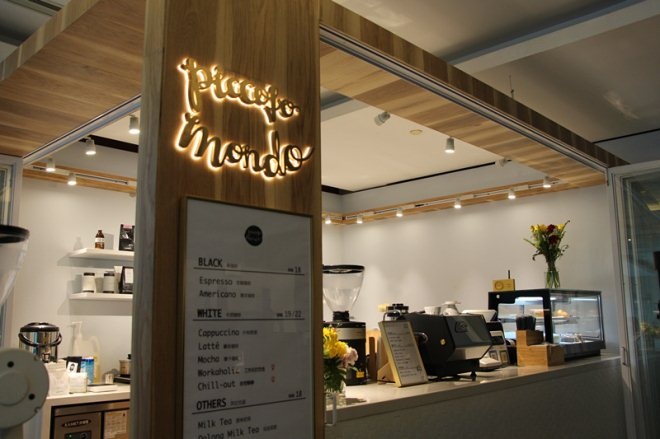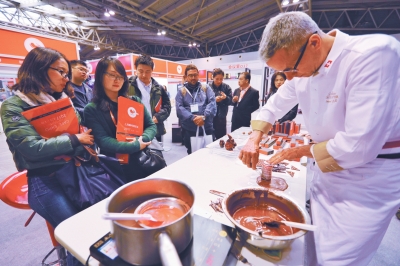After the strong premium ability, the high-priced "small but beautiful" coffee market is still very large.

On March 22nd, the self-created coffee brand Piccolo Mondo held an offline sharing meeting with the theme of "Melbourne Coffee Tour" in Hangzhou Dun'an Development Building. It is reported that this is the second offline activity of the store since its trial operation at the beginning of this month.
"We want to popularize coffee culture through this platform." Mr. Ma, the person in charge of Piccolo Mondo, told Lianshang.com, "at present, people's understanding of coffee is still on the surface, and they even have misunderstandings about the coffee market."
The market for "small and beautiful" coffee is still very large.
Since 1998, the annual growth rate of per capita coffee consumption in China has far exceeded the annual growth rate of world coffee consumption. China's income from ready-to-drink coffee reached nearly 8 billion yuan in 2009 and climbed to 70 billion yuan in 2012, an annual increase of 15% to 20%. It is estimated that by 2020, the capacity of China's coffee market will reach 300 billion. Some experts say that if it is extended to freshly ground coffee and brewing coffee, the total market volume can even reach the level of one trillion yuan.
Heading for the huge domestic coffee market, the major foreign brands have also rushed to land. At a time when the mass coffee market was carved up by Starbucks, Costa and newcomers KFC and McDonald's, Piccolo Mondo focused on the coffee segment.
Different from the popular coffee chain that was born with the brand of "fast food", Piccolo Mondo focuses on "small and beautiful" boutique coffee, learning from the coffee way of Melbourne, the coffee capital, to convey coffee culture to the Chinese people.
"although this is a long process and needs to slowly cultivate consumers, as long as the market opens, the coffee segment still has its prospects." Cheng Wei, one of the partners of Piccolo Mondo, talked about it. As Li Ling, queen of department stores, said: "the really good businessmen will tap the needs of their customers." In many cases, the demand is potential, even consumers themselves are very difficult to detect. "
Nunu, the head of 1%, another coffee shop of the same type, corroborated this view. This small "community coffee shop", with an area of about 30 square meters, only sells handcups, lattes and American styles, and does well without Wechat accounts and other publicity channels. The boss was also "forced" to open two stores one after another in Hangzhou, although the boss only sold technology.
Statistics show that famous cafes in Melbourne can produce 90-1400 cups a day. In Hangzhou, some good boutique coffee brands produce only about 100-200 cups a day.
"A lot of people who have drunk my coffee not only come here often, but also introduce some friends." Nunu talked about. When these people further accept the coffee culture transmitted to them by the stores, the demand is reactivated, and eventually a demand community will be formed.
High performance-to-price ratio and premium ability of coffee
"it feels great to have more than 30 dollars of coffee in hand, especially Starbucks." Mr. Ma joked, "A good cup of coffee is not equal to a high price." The newly opened Piccolo Mondo reflects this in terms of area, unit price, coffee beans, coffee maker, barista and bean grinder.
25 square meters of space, equipped with two dispensers, serving the white-collar workers of the surrounding office buildings, spending about 20 yuan to provide high-quality coffee that may come from 108 countries and regions around the world.
Obviously, cost control has become one of its core competencies. Cheng Wei of Piccolo Mondo said, "on the basis of ensuring quality, we have controlled the cost within a very reasonable range." They will cooperate with some well-known domestic suppliers and bring back some high-quality coffee beans from abroad from time to time.
In the Chinese market, the main coffee brands led by Starbucks are still willing to pay for its premium because of its high brand value, a wide variety of products, taste suitable for the general public and other factors. Minority brand misplaced competition may also be a way out.
Important Notice :
前街咖啡 FrontStreet Coffee has moved to new addredd:
FrontStreet Coffee Address: 315,Donghua East Road,GuangZhou
Tel:020 38364473
- Prev

Pudong: Shanghai Coffee Chocolate Exhibition held
In front of a handmade chocolate brand exhibition in Switzerland, spectators stop to watch the production process. The 2017 Shanghai Coffee and Chocolate Exhibition was held at the Shanghai World Expo Hall from March 22 to 24. This exhibition is characterized by its product popularity and industry professionalism, market popularization and cultural diversity, which has attracted a large number of coffee and chocolate lovers and related industry people to visit. This exhibition
- Next

How is the business of the coffee delivered to the door?
Working in a tight-paced, competitive office, tiredness often strikes inadvertently. At this time, many white-collar workers want to drink a cup of coffee that suits their taste as soon as possible. Actually, there are many choices for a cup of coffee. Instant coffee, hanging ear coffee, capsule coffee machine and the coffee shop near the company, the first three choices are always unsatisfactory in taste, while the latter
Related
- What grade does Jamaica Blue Mountain No. 1 coffee belong to and how to drink it better? What is the highest grade of Blue Mountain coffee for coffee aristocrats?
- What are the flavor characteristics of the world-famous coffee Blue Mountain No. 1 Golden Mantelin? What are the characteristics of deep-roasted bitter coffee?
- Can I make coffee a second time in an Italian hand-brewed mocha pot? Why can't coffee be brewed several times like tea leaves?
- Hand-brewed coffee flows with a knife and a tornado. How to brew it? What is the proportion of grinding water and water temperature divided into?
- What is the difference between Indonesian Sumatra Mantinin coffee and gold Mantinin? How to distinguish between real and fake golden Mantelin coffee?
- What does bypass mean in coffee? Why can hand-brewed coffee and water make it better?
- Unexpected! Ruixing Telunsu lattes use a smoothie machine to foam milk?!
- % Arabia's first store in Henan opens into the village?! Netizen: Thought it was P's
- Does an authentic standard mocha coffee recipe use chocolate sauce or powder? Mocha Latte/Dirty Coffee/Salty Mocha Coffee Recipe Share!
- What is the difference between Vietnam egg coffee and Norway egg coffee? Hand-brewed single product coffee filter paper filter cloth filter flat solution!

